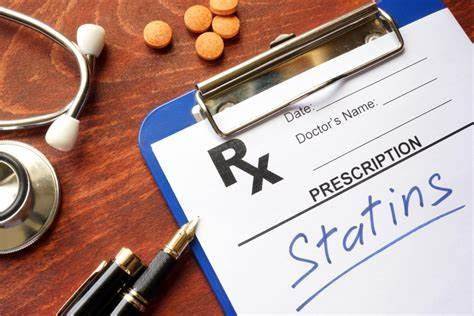Now, many friends are taking statin drugs to control their blood lipid levels and prevent the occurrence of cardiovascular diseases. Before taking the medication, doctors often inform their friends to have a follow-up visit to the hospital within three months.
Many friends do not understand this and think that as long as they don’t feel any abnormalities, they can continue taking the medication, so why do they need to go to the hospital for a follow-up visit? It seems like a waste of time and money. Is this really the case? Today, let’s discuss this issue.
Why do doctors need friends taking medication to have regular check-ups?
Patients taking statin drugs, doctors insist on having them come for follow-up visits mainly for two reasons:
1. Observing the effectiveness of the medication.
Taking statin drugs is mainly aimed at controlling the levels of low-density lipoprotein cholesterol in the blood. Low-density lipoprotein cholesterol is a high-risk factor for atherosclerosis and must be lowered to an ideal range to effectively prevent the occurrence of cardiovascular diseases.
For different individuals, the ideal level of low-density lipoprotein cholesterol varies. If there are no high-risk factors (smoking, obesity, chronic diseases, family history of early onset cardiovascular diseases, etc.), lowering it to a normal range is generally sufficient. The ideal state is below 2.6, and if there are over three high-risk factors or a history of cardiovascular diseases, the low-density lipoprotein cholesterol must be lowered to below 1.8.
Each person’s sensitivity to medication varies, and not everyone can achieve the ideal level after taking the medication. Generally, after four weeks of medication, the drug concentration in the blood becomes relatively stable, and the medication’s effectiveness reaches a stable state.
At this point, relevant tests can clarify the medication’s effects. If they meet the standards, the medication can continue; if not, the dosage may need further adjustment, or combination with other lipid-lowering drugs.
2. Preventing medication side effects
No medication is without side effects, and taking any medication can lead to certain side effects. When using statin drugs for treatment, long-term medication is often required, and some friends may even need lifelong medication. Therefore, its side effects cannot be ignored. Common side effects of statin drugs include:
– Elevated blood sugar: Many friends may experience increased blood sugar after taking the medication. While some doctors may be skeptical about this, studies have shown that many friends indeed experience a significant rise in blood sugar after taking the medication. However, the risk of this side effect is negligible compared to the benefits of the medication. Elevated blood sugar can be managed through lifestyle interventions and medication to restore normal levels.
– Liver damage: Most statin drugs require liver metabolism; thus, they have a certain impact on liver function. Although some statins are metabolized by the kidneys, their target site is the liver, which can also lead to elevated transaminases. Therefore, regular checks are necessary when taking statin drugs to detect liver damage early.
– Muscle pain: Statin drugs can have an adverse effect on skeletal muscles, leading to muscle pain. Some may even experience rhabdomyolysis, characterized by muscle pain, dark urine, and kidney damage. Some friends may question whether they need follow-up checks if they don’t have muscle pain symptoms. However, even without symptoms, follow-up checks are crucial. There have been cases where friends showed no muscle pain symptoms but already had kidney dysfunction when visiting the hospital. Therefore, follow-up checks are recommended regardless of symptoms.
For these reasons, doctors advise friends taking statin drugs to have regular follow-up visits to the hospital. So, what tests are usually conducted during these hospital visits?
Long-term use of statins requires the following tests:
– Lipid profile: typically including total cholesterol, high-density lipoprotein cholesterol, low-density lipoprotein cholesterol, and triglycerides. Statin drugs primarily target lowering the levels of low-density lipoprotein cholesterol, which vary based on individual requirements. Doctors adjust the medication dosage based on test results accordingly.
– Liver and kidney function: Since statin drugs can affect liver and kidney function, regular checks for these functions are vital. If transaminase levels exceed three times the normal high value, it indicates liver damage, requiring dosage adjustments or medication changes. Blood sugar: Many friends may experience elevated blood sugar when taking statin drugs. This can usually be managed through lifestyle adjustments. If blood sugar remains high despite lifestyle changes, antidiabetic medications may be needed.
– Creatine kinase: An indicator for rhabdomyolysis. If levels are significantly elevated, it signals a potential risk of rhabdomyolysis. Since this condition can lead to kidney damage, immediate discontinuation of statin drugs is necessary upon detection. How often should one undergo tests when taking statin drugs?
As a general guideline, within the first three months of medication, it is recommended to undergo the above blood tests at least twice to observe the effectiveness and detect any possible side effects. After three months, if everything remains within the ideal range, follow-up tests every six months to a year are adequate. In case of adverse symptoms, immediate hospital visits are recommended.
Summary
Due to the long-term use of statin drugs, regular follow-up tests are necessary to observe medication effectiveness and detect any potential side effects. This allows for timely adjustments in medication dosages or immediate discontinuation if side effects arise. The main side effects of statin drugs include increased blood sugar, liver damage, and muscle toxicity. Prompt management of side effects minimizes their impact on the body’s health.
Regarding the question of “why do I need regular follow-ups when taking statin drugs,” we have covered this topic today. If you agree with Dr. Zhang’s perspective, feel free to like, comment, or engage further. Your support is appreciated, and any additional questions or viewpoints are welcome in the comments section, as they are valuable inspirations for future discussions. I am Dr. Zhang Wei, and until next time.


